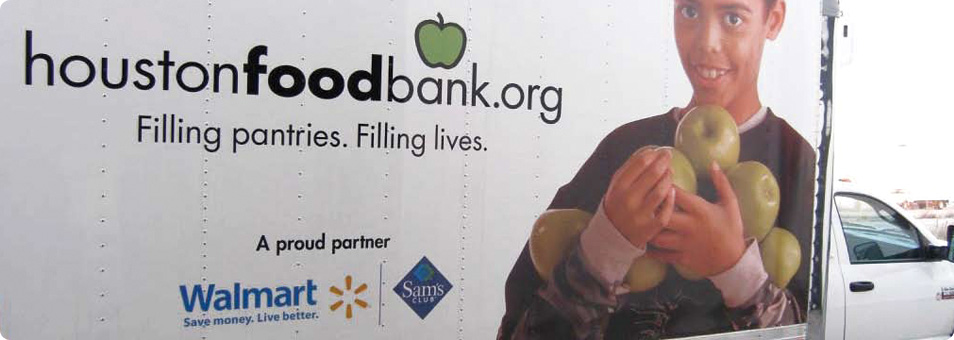
Charitable Giving - Feature Story: Wal-Mart and Hunger Relief
While the economic crisis continues to impact communities around the globe, Wal-Mart's long-term commitment to giving back locally has made the Company — and our domestic and international Foundations — trusted sources of funding for much-needed community programs, especially those that address hunger, homelessness, education, job training and other basic needs.
In the U.S., Walmart continues to stand shoulder-to-shoulder with those on Main Street who have turned to organizations like Feeding America, the nation's largest hunger relief organization, to make ends meet. In fact, Walmart's food donation program provided more than 33 million pounds of fresh produce, meat and other nutritious foods to U.S. food banks in 2008. These in-kind contributions have an estimated value of more than $85 million; and Walmart stores and Sam's Club locations remain on track to donate 90 million pounds of food by November 2009.
Food donations from Walmart are benefitting food banks, soup kitchens and food pantries across America. And, the Wal-Mart Foundation has made cash contributions to further hunger relief efforts when service organizations in our nation need help the most. Meals on Wheels Association of America and the seniors that it serves, in particular, have benefitted tremendously from the Wal-Mart Foundation's efforts. Enid A. Borden, the organization's president and CEO recently wrote:
"All Americans are facing difficult financial times right now. We at the Meals On Wheels Association of America and the 5000 Meals On Wheels programs nationwide are not immune to financial difficulties. In fact, well in advance of the current recession, many local meal programs were experiencing significant strains associated with trying to keep up with the growing demand to serve vulnerable seniors. Already challenged by the need to carefully manage capacity, such programs were further burdened by serious losses in volunteer labor and budget shortfalls prompted by the steep rise in gas and food prices that began in the spring of 2008.
In short, things were not looking good for our Meals On Wheels programs and the hundreds of thousands of seniors who depend on them — in many instances for their very lives. And then came the Wal-Mart Foundation. Their decision to join us in the fight to end senior hunger by becoming our partner is a life-saver. We call this partnership the MOWAA/ Wal-Mart Foundation Cure Grants because these grants are going to our local Meals On Wheels to help them cure the disease of hunger. These grants will be used by our local programs to end waiting lists, to add routes where there was no capacity to do so before, and to help dozens of local meal programs in 40 states reverse the progression of the disease of senior hunger by replenishing resources that allow them to feed America's oftentimes forgotten seniors.
Senior hunger is a disease. But unlike other diseases, this one has a cure. We can end this disease today if we have the will, the courage, and the partners to help us. Wal-Mart is that partner and they are indeed helping us get one step closer to the day when, in this the richest nation on Earth, no senior goes hungry. Thanks to the Wal-Mart Foundation we are 'working on that cure' today."
During these tough economic times, Wal-Mart and the Wal-Mart Foundation have a responsibility to continually look for ways to increase giving and focus local contributions towards organizations that can do the most good — and have a lasting, positive impact in communities around the globe.




